From November 20 to 23, 2024 U.S.-China People’s Dialogue: Charting a Path Forward was held in Beijing. The event was co-organized by the Center for International Security and Strategy (CISS) of Tsinghua University and the National Committee on U.S.-China Relations (NCUSCR).
This is the second dialogue after the U.S.-China People’s Dialogue: Our Stories, Our Ideas held by the two organizations in October 2023 in New York, USA. The event aims to demonstrate the depth, breadth, and temperature of U.S.-China people-to-people exchanges, promote exchanges and understanding between the peoples of China and the U.S., explore the development path of U.S.-China people-to-people exchanges under the current situation, and help stabilize the relationship between the two countries. The event has a rich agenda, including a welcome dinner, pairings between Chinese and American guests, and closed-door seminars. It covers various topics such as tourism & ecology, artificial intelligence (AI), long-term residents, food, business & investment, and sports. Wang Gang, Deputy Minister of the Publicity Department of the CPC Central Committee, attended the event. Key guests participating in the Dialogue included Fu Ying, former Vice Minister of the Ministry of Foreign Affairs of the People’s Republic of China; Zhu Min, former Deputy Governor of the People’s Bank of China; Yang Bin, Vice President of Tsinghua University; Da Wei, Director of CISS; Charlene Barshefsky, Chair of NCUSCR and former U.S. Trade Representative; and Stephen Orlins, President of NCUSCR.
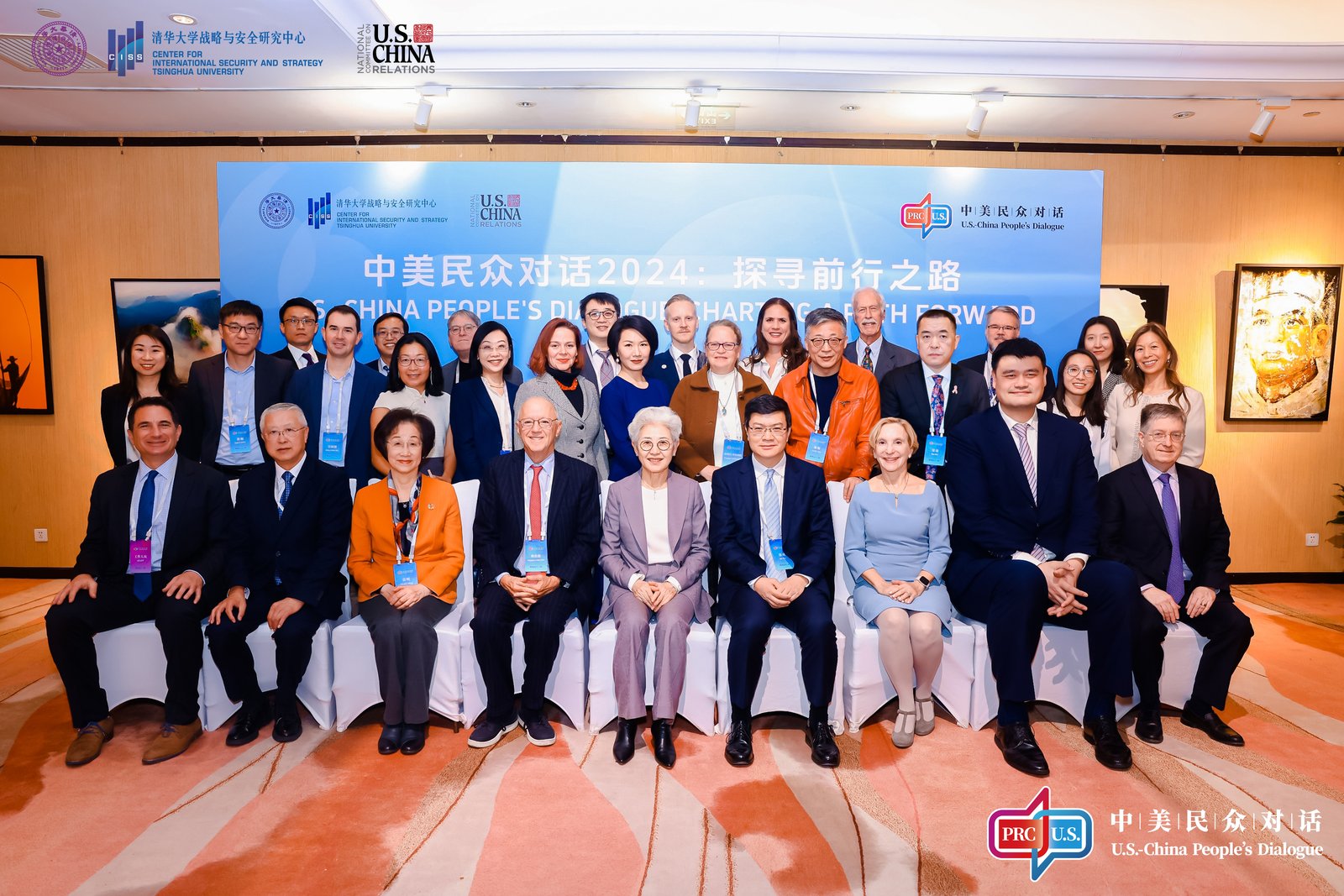
At the welcome dinner on November 20, Deputy Minister Wang Gang delivered a keynote speech. Wang began his introduction with a quotation from President Xi Jinping, “The foundation of China-U.S. relations was laid by our peoples. The door of China-U.S. relations was opened by our peoples. The stories of China-U.S. relations are written by our peoples. The future of China-U.S. relations will be created by our peoples.” Wang recounted to the Chinese and American guests present three stories: People in Zhejiang, China, rescued Doolittle Squadron pilots during the Chinese People’s War of Resistance against Japanese Aggression; U.S. President Nixon ran into a Chinese girl at West Lake during his visit to China in 1972; and President Xi Jinping cared for the development of Wenzhou-Kean University. These stories demonstrate the long history of exchanges and the deep friendships between the two countries’ peoples. Wang pointed out that China and the U.S. should uphold an open and inclusive mindset, enhance the courage to face differences, and develop a mutual appreciation for each other, so as to strengthen the ties of people-to-people exchanges between the two countries.
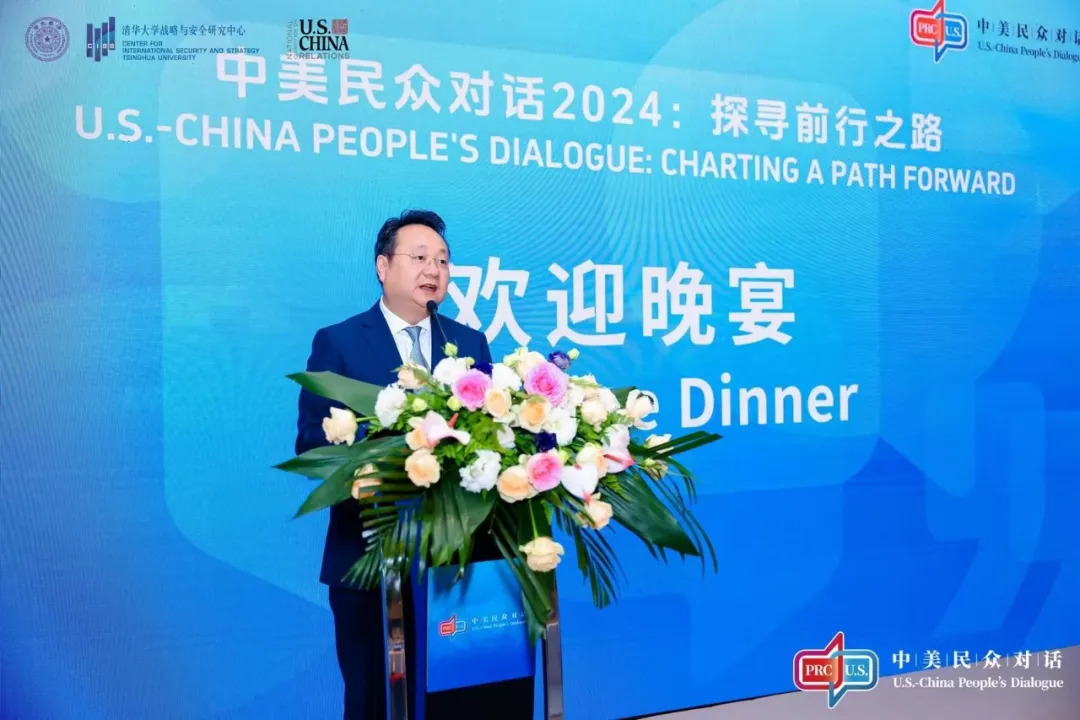
After the keynote speech, Da Wei moderated a special dialogue joined by Fu Ying; Zhu Min, former Deputy Governor of the People’s Bank of China and former Deputy Managing Director of the International Monetary Fund; Charlene Barshefsky; and Stephen Orlins. They focused on the role and positioning of civil exchanges in the overall U.S.-China relations, the benefits of the history of U.S.-China contacts and interactions for both countries and the world, and the prospects for U.S.-China people-to-people exchanges in the new international political context. They all emphasized the long-term role of people-to-people exchanges in U.S.-China relations. Amidst the ups and downs in U.S.-China relations, civil exchanges are the most resilient and supportive force.
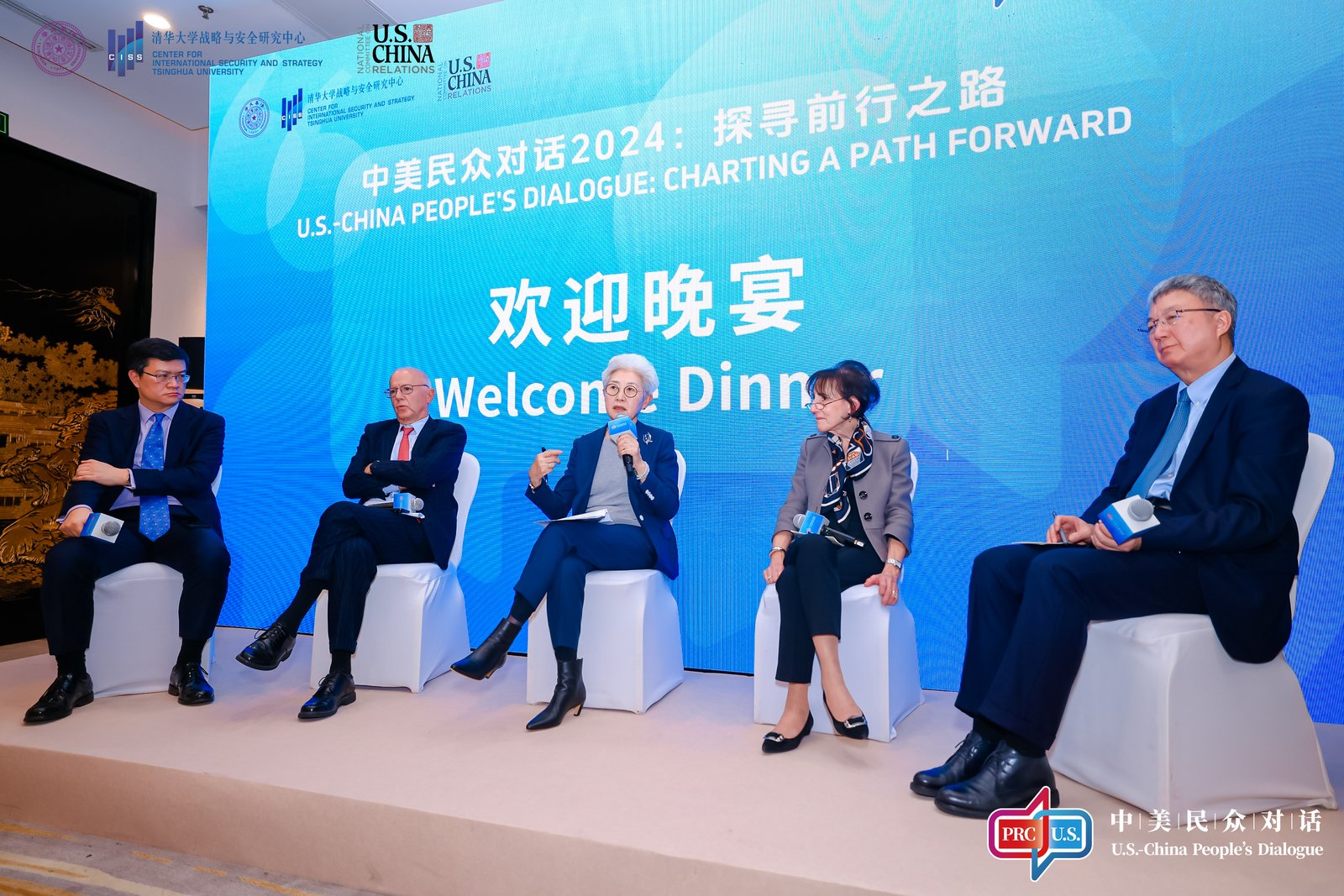
The first open pairing under the theme of “Tourism & Ecology” was moderated by Jon Lowet, Vice President of Programs at NCUSCR. During the pairing, Douglas Morris, Board Chair of Global Parks, and Ms. Zhang Mei, Founder and Chairlady of WildChina, had an in-depth exchange of views on the topic. Morris shared the experience of U.S.-China cooperation in national park construction, emphasizing the importance of protecting the natural environment and the significant role of national parks in promoting U.S.-China cooperation. Zhang shared her experiences of deepening cultural exchanges through the tourism business from the perspective of a frontline worker in the tourism industry. Both sides agreed that tourism is not only an economic activity but also an important means of cultural exchange. They recommended emphasizing the potential and responsibility of tourism in promoting people-to-people exchanges between the two countries.
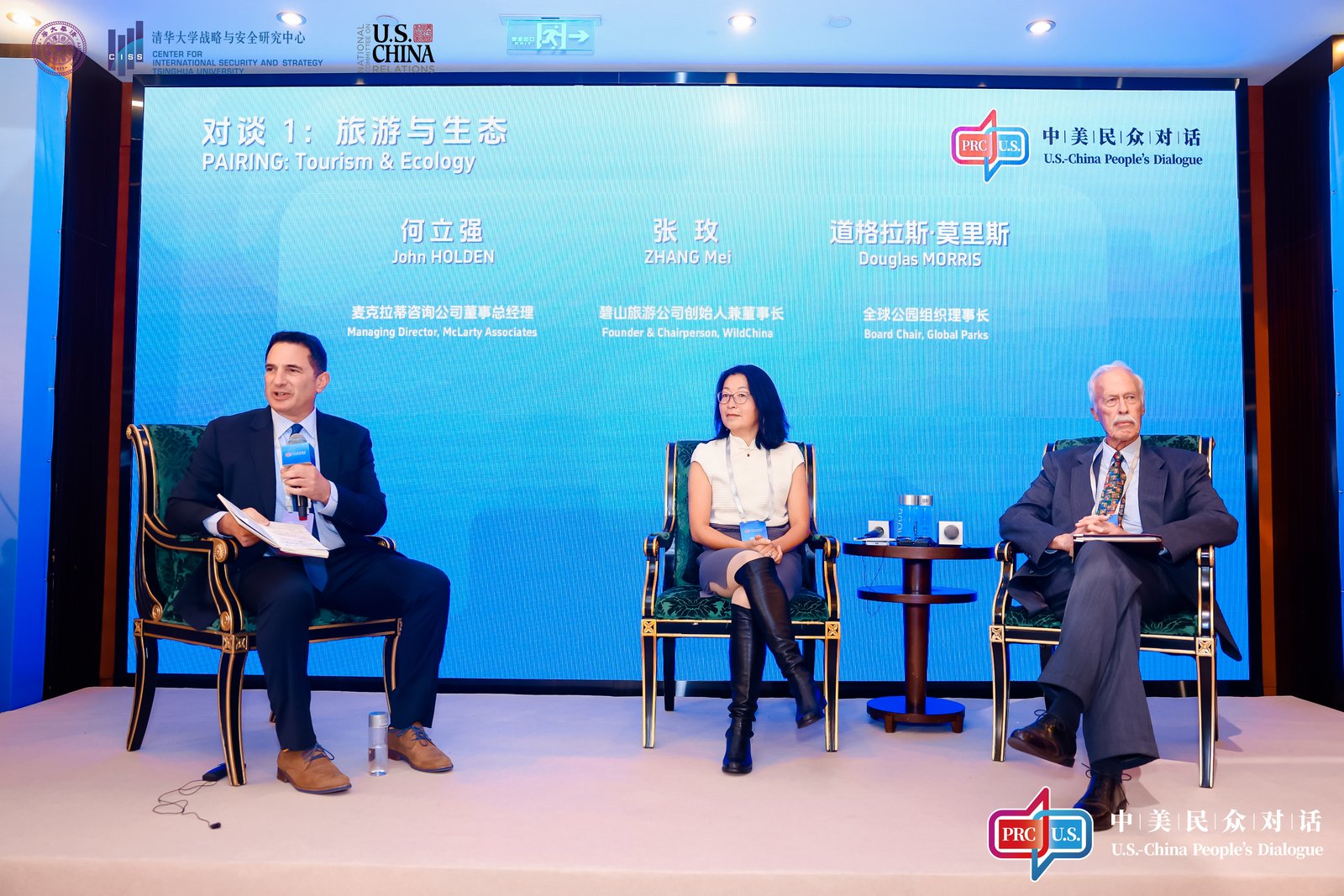
The second pairing focused on AI and was moderated by Liu Xin, Senior Host of China Global Television Network (CGTN). Zhan Xianyuan, Research Assistant Professor of the Institute for AI Industry Research at Tsinghua University, and Kevin Xu, Founder of Interconnected Capital in the U.S., discussed competition and cooperation in AI technology. Zhan emphasized the rapid development and open-source nature of AI and the openness and rapid iteration of AI development. He also pointed out the barriers to AI cooperation between China and the U.S. Kevin Xu analyzed the infrastructure construction of AI from the enterprise’s perspective and the cooperation potential in the field of AI applications at the infrastructure and model level.
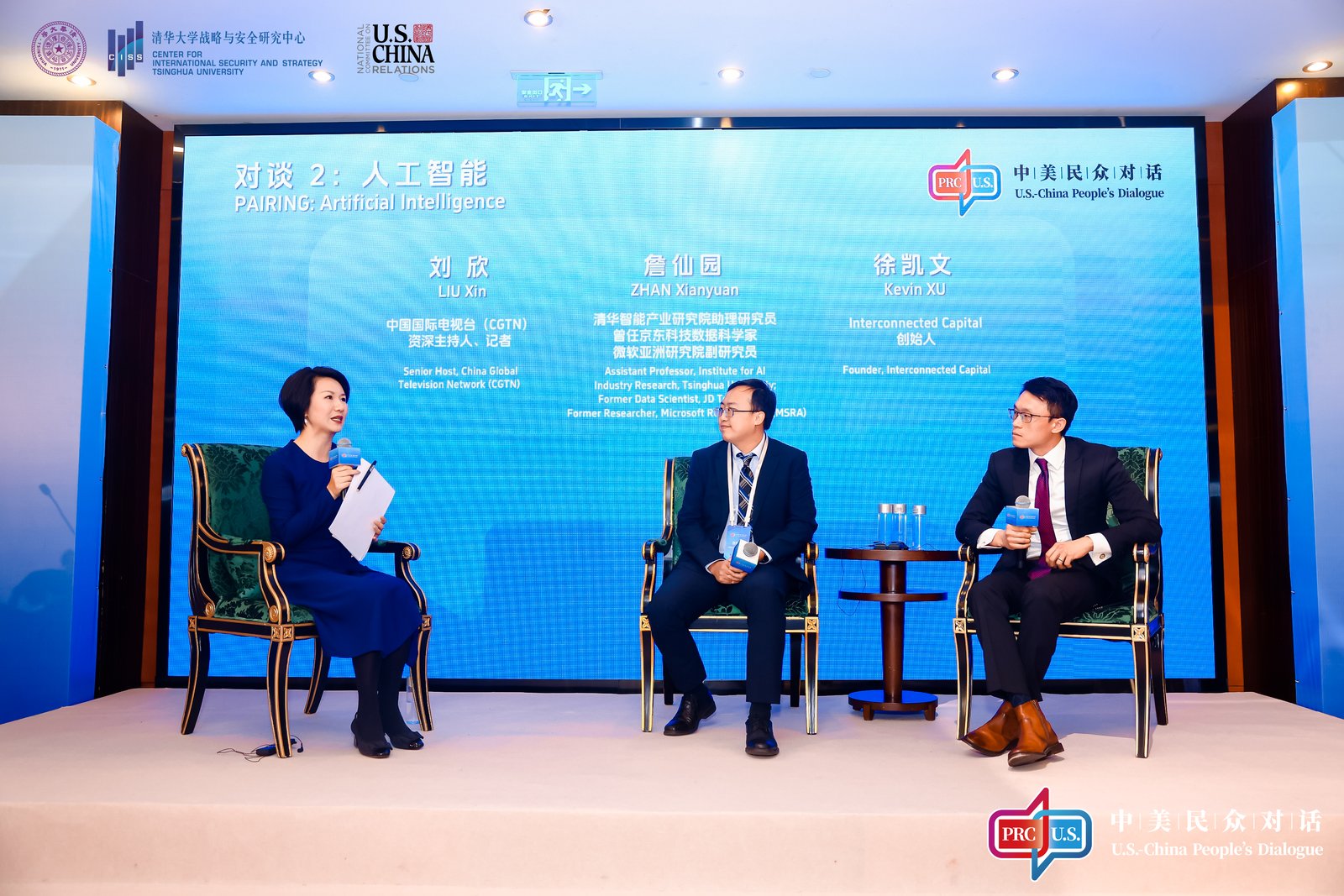
The third pairing, titled Long-term Residents, was moderated by Yang Rui, Founder of Smart East International Culture Media Ltd. and former Host of CGTN. David Moser, Associate Professor of the College of Foreign Languages at Capital Normal University, and John Gong, Professor of the Department of Economics at the University of International Business and Economics, shared their observations and feelings about living in China and the U.S. as long-term residents. Moser emphasized the natural affinity between the peoples of China and the U.S. Gong discussed the impact of U.S.-China relations changes on personal identity, suggesting the importance of the peoples in both countries adapting to and understanding each other’s cultures in the context of globalization.
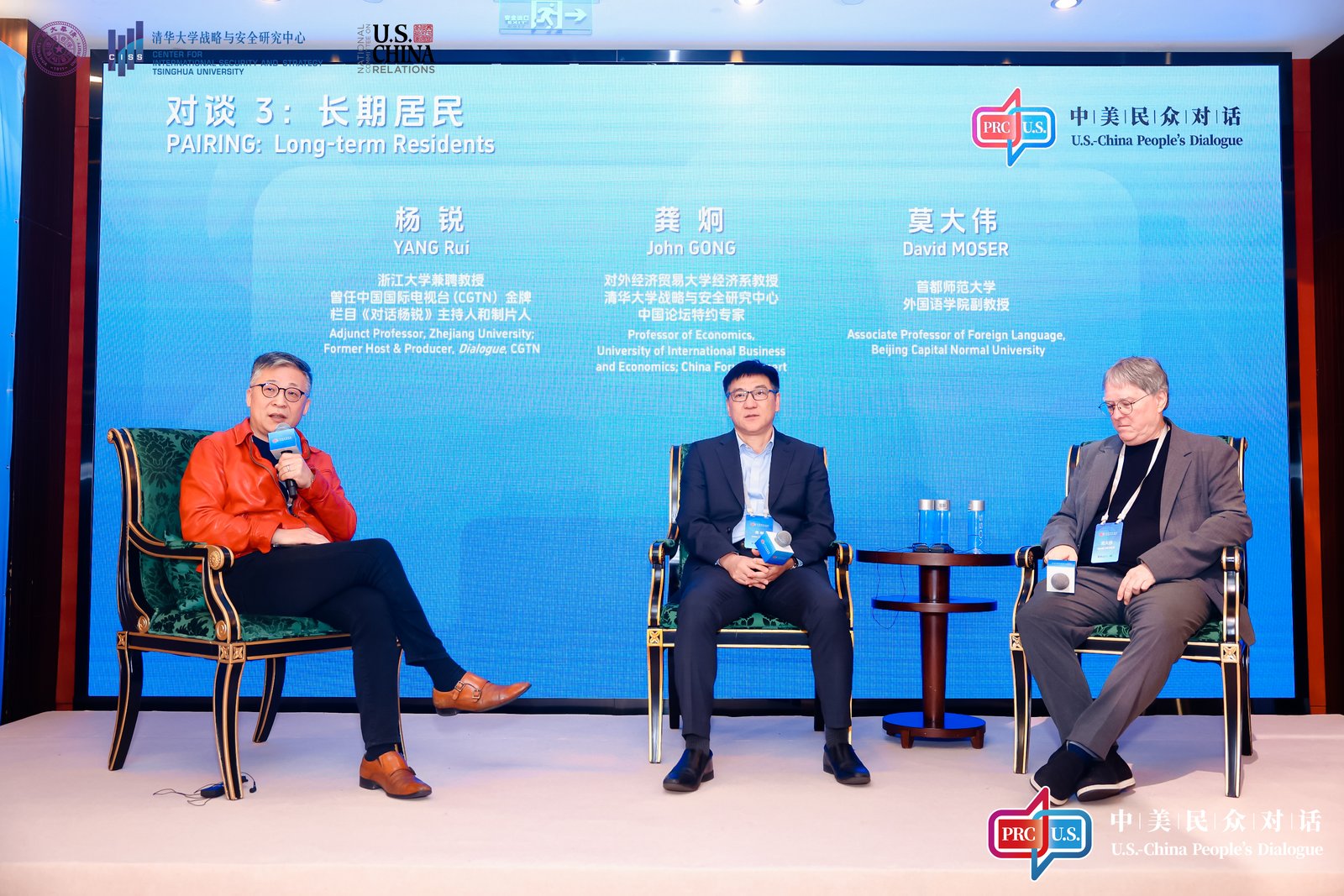
At noon on November 21, Deputy Governor Zhu Min gave a lunchtime remark to the guests present. Zhu shared his views on the main challenges facing China’s economy, the current economic policies adopted by the Chinese government, and the changes in China’s economic growth model. According to Zhu, although China is facing several economic challenges, the Chinese government has responded effectively by giving local governments more fiscal space and boosting the stock market. Zhu pointed out that China’s economy has vast opportunities in the areas of domestic consumption, digitization of the manufacturing sector, and carbon neutrality, which are potential growth areas for China’s economy in the future.
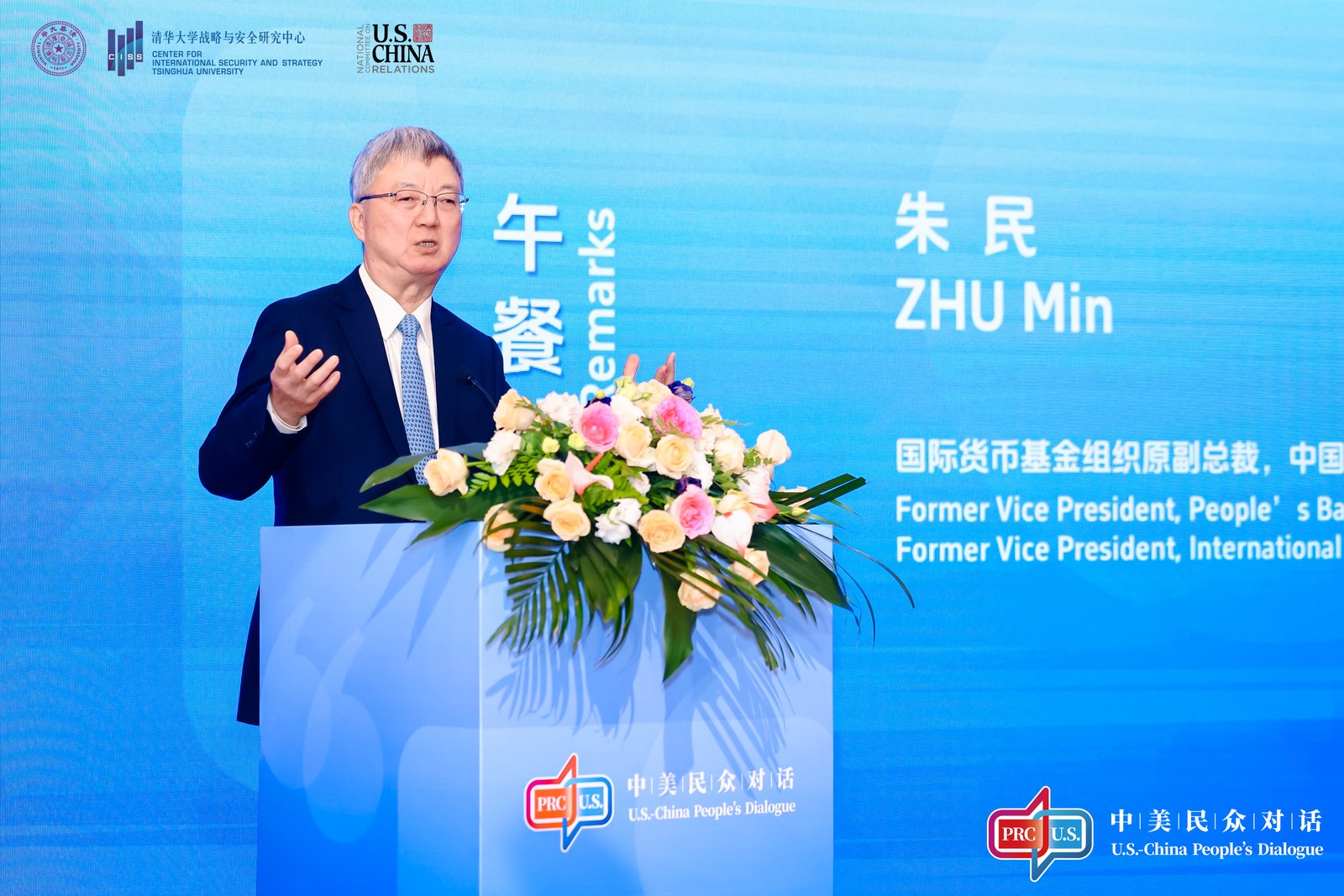
The fourth pairing focused on culture and connectivity in the U.S.-China food and beverage industry and was moderated by Nancy Yao, Assistant Dean and Assistant Professor of David Geffen School of Drama at Yale University. Cao Yu, Culinary Anthropologist, and Michael Rosenblum, Culinary Anthropologist, Award-winning Chef, and Principal of FMC Consulting Limited, had an in-depth discussion on the significance of food as a cultural connector. Cao explained how food carries cultural memories and family traditions in light of his own upbringing. He believes that the history of Chinese food spreading in the U.S. epitomizes the cultural exchange between the two countries. Rosenblum shared his experiences as a chef at the U.S. Embassy in Beijing from the perspective of cultural integration between China and the U.S. He believes that food is a silent language that can transcend cultural boundaries and ease tensions and that food can be used as a medium to promote U.S.-China communication.
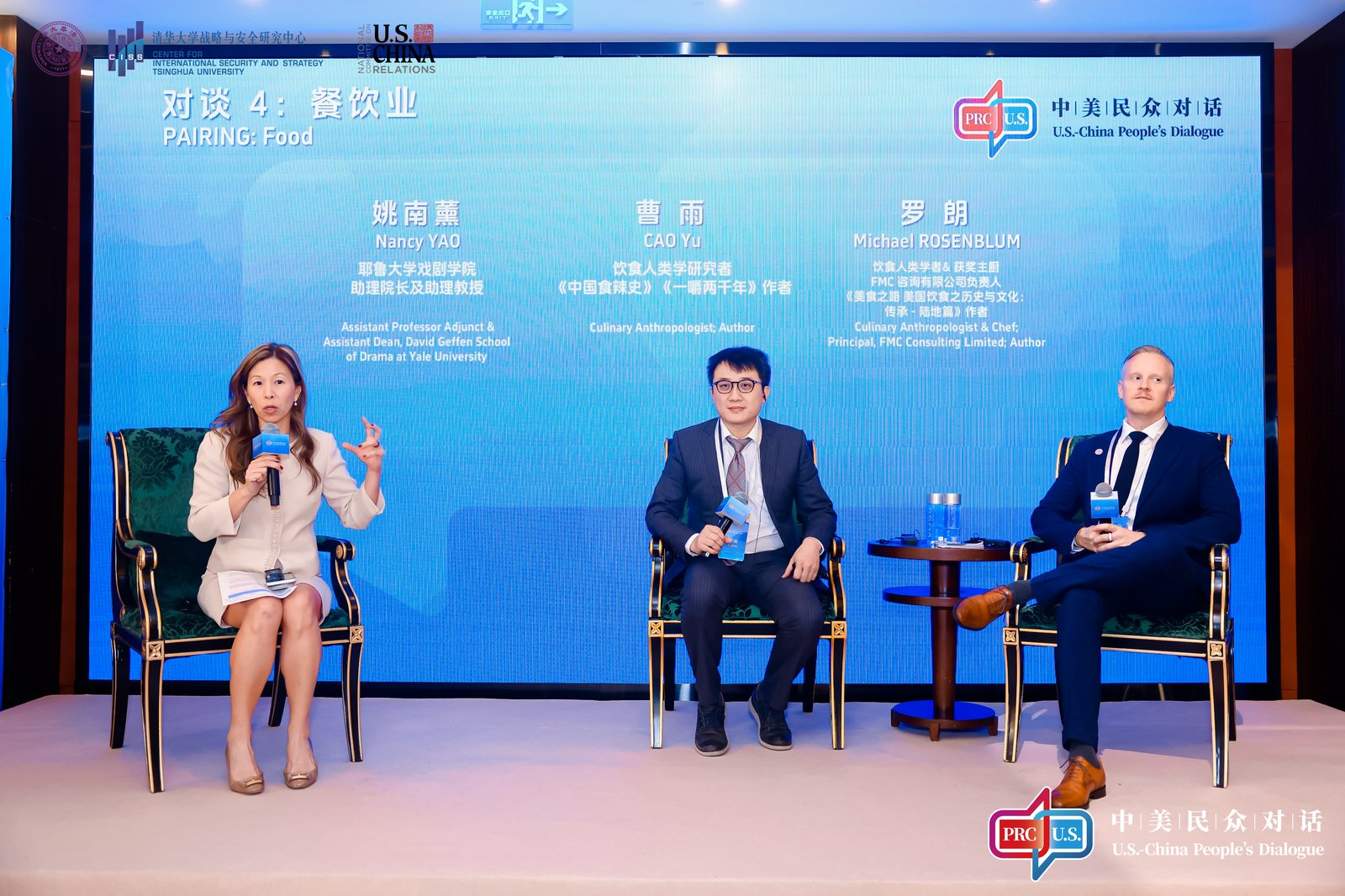
The fifth pairing, moderated by Orlins, centered on the present and future of business cooperation between China and the U.S. Deng Feng, Founder of Northern Light Venture Capital, and Ming Hsieh, Chairman and CEO of Fulgent Genetics, shared their perspectives on business cooperation between China and the U.S. in the fields of high tech and healthcare from their own experience. Deng shared the comparison of the education and innovation system between China and the U.S. with his own experiences of studying abroad and starting his own business. He said that despite the complexity of the current situation, China and the U.S. still have vast potential for cooperation in the fields of science and technology innovation and sustainable development. Hsieh referred to the medical and life science fields as the focus of future U.S.-China cooperation, suggesting that cancer drug research and development should be accelerated through the establishment of globally harmonized standards for drug development to benefit patients in both countries and around the world.
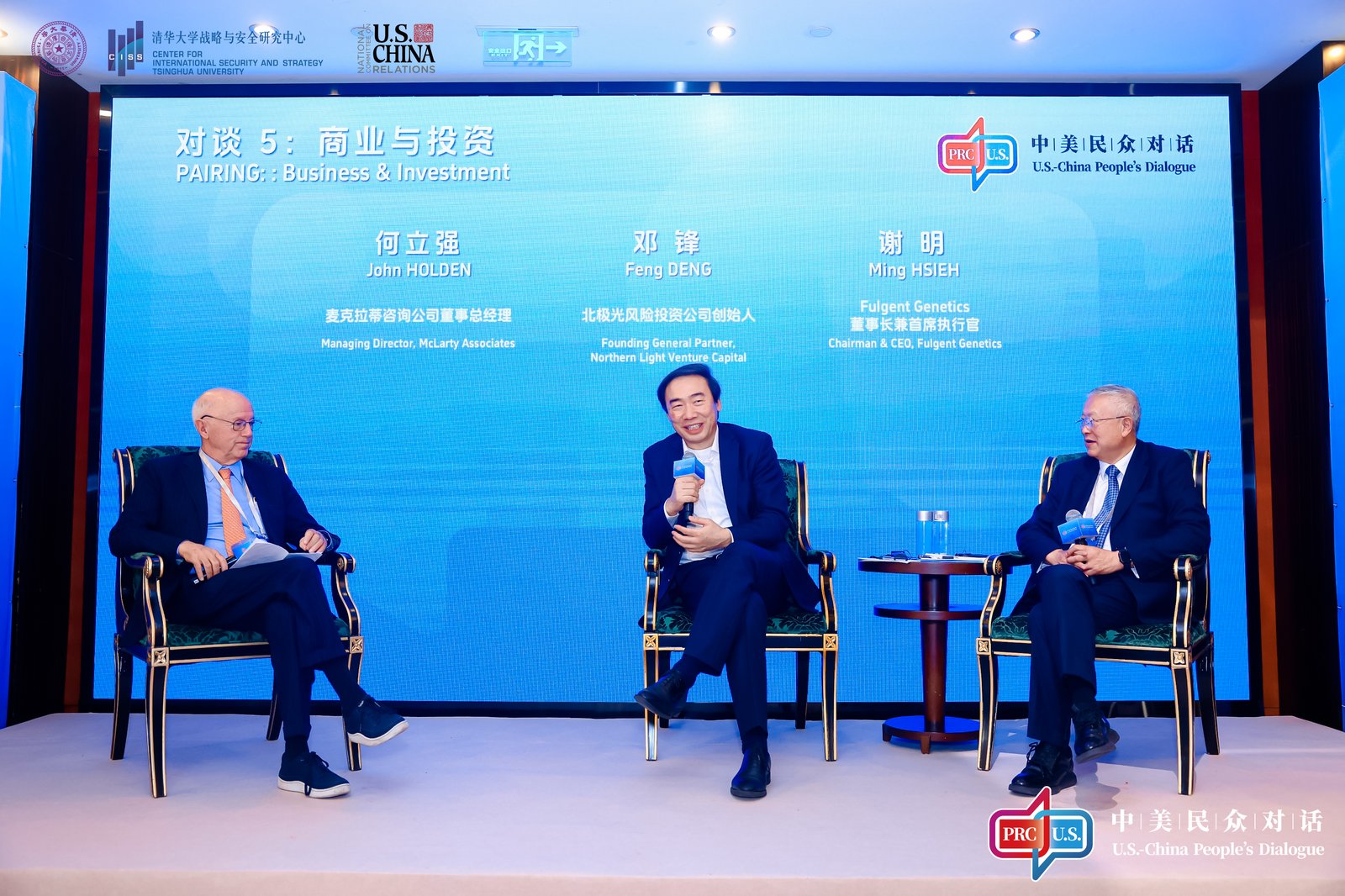
The sixth pairing focused on sports as a bridge to promote U.S.-China exchanges and was moderated by Nancy Yao. Yao Ming, Vice President of the All-China Youth Federation and Founder of the Yao Foundation, and Logan Tom, Vice President of Player Personnel of the Pro Volleyball Federation and former star player of the U.S. Women’s National Volleyball Team, discussed the cultural significance and diplomatic role of sports. Drawing on his own experiences as an athlete and practitioner of public welfare causes, Yao pointed out that sports are not only competitive arenas but also important tools for bringing different cultures closer together. Tom shared her cross-cultural experience in global competition and coaching. She believes that sports are an excellent way to break through language and cultural barriers. Tom also introduced her practice of promoting international understanding through volleyball.
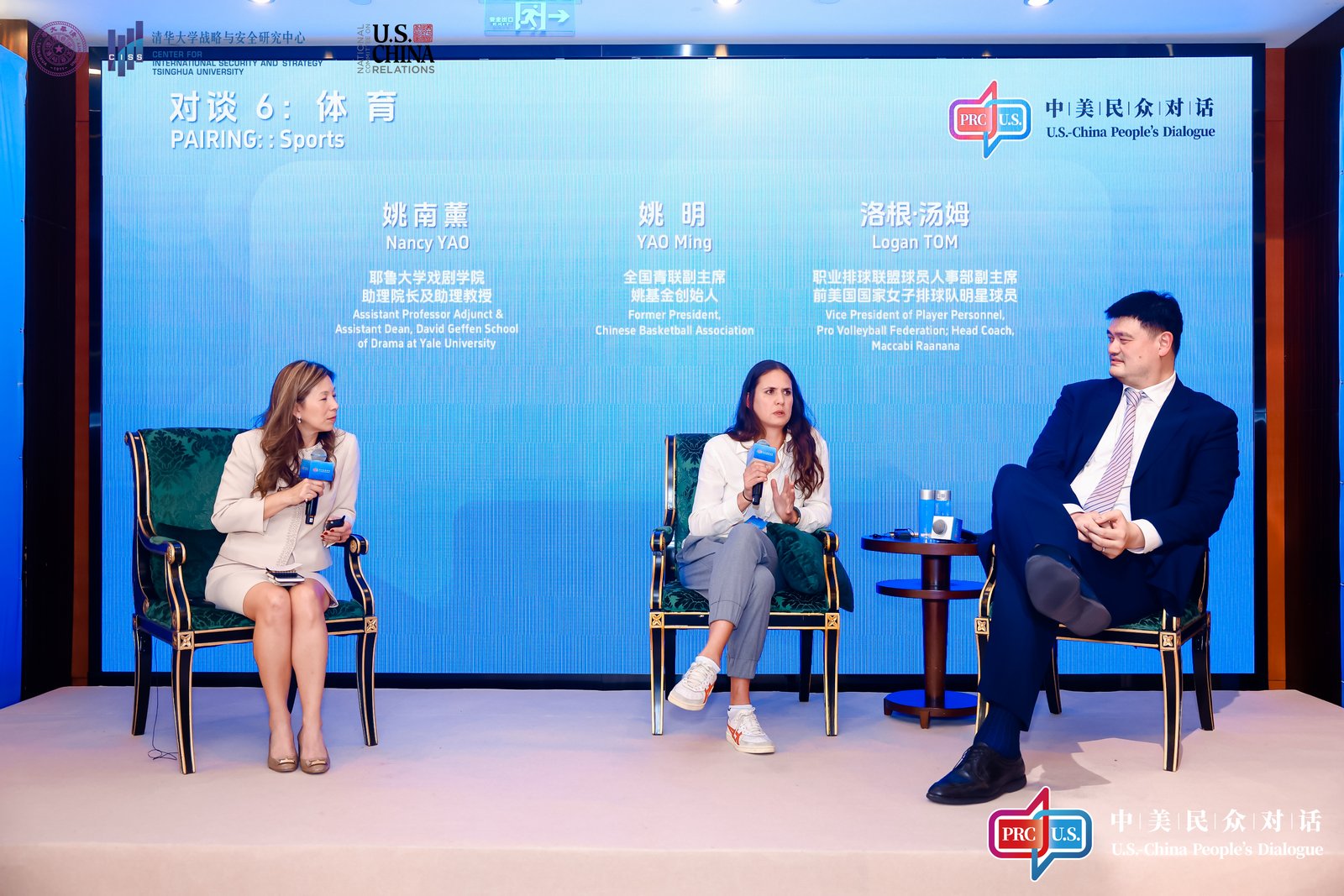
The seventh pairing, focusing on the current situation and challenges of student exchanges between Chinese and American universities, was moderated by Liu Xin. Yang Bin, a Member of the Standing Committee of the CPC Tsinghua University Committee and Vice President of Tsinghua University, and Jeffrey S. Lehman, Vice Chancellor of New York University Shanghai, shared their perspectives on Chinese and American young people’s study and life abroad in the light of their own work experience. Yang pointed out that the U.S.-China student exchange programs have recovered to a certain extent after the pandemic, and the plan to invite 50,000 American youths to visit China in the next five years reflects the importance that Chinese leaders attach to U.S.-China people-to-people exchanges. However, exchanges between college administrators and scholars have yet to be revitalized, and the depth of international students’ learning has yet to be enhanced. Lehman believes that student exchanges between the U.S. and China are hampered by geopolitics, travel warnings and visa procedures, and negative media releases. He emphasized that international students in China and the U.S. should seize the opportunity to meet friends and broaden their horizons, which will help them understand each other better.
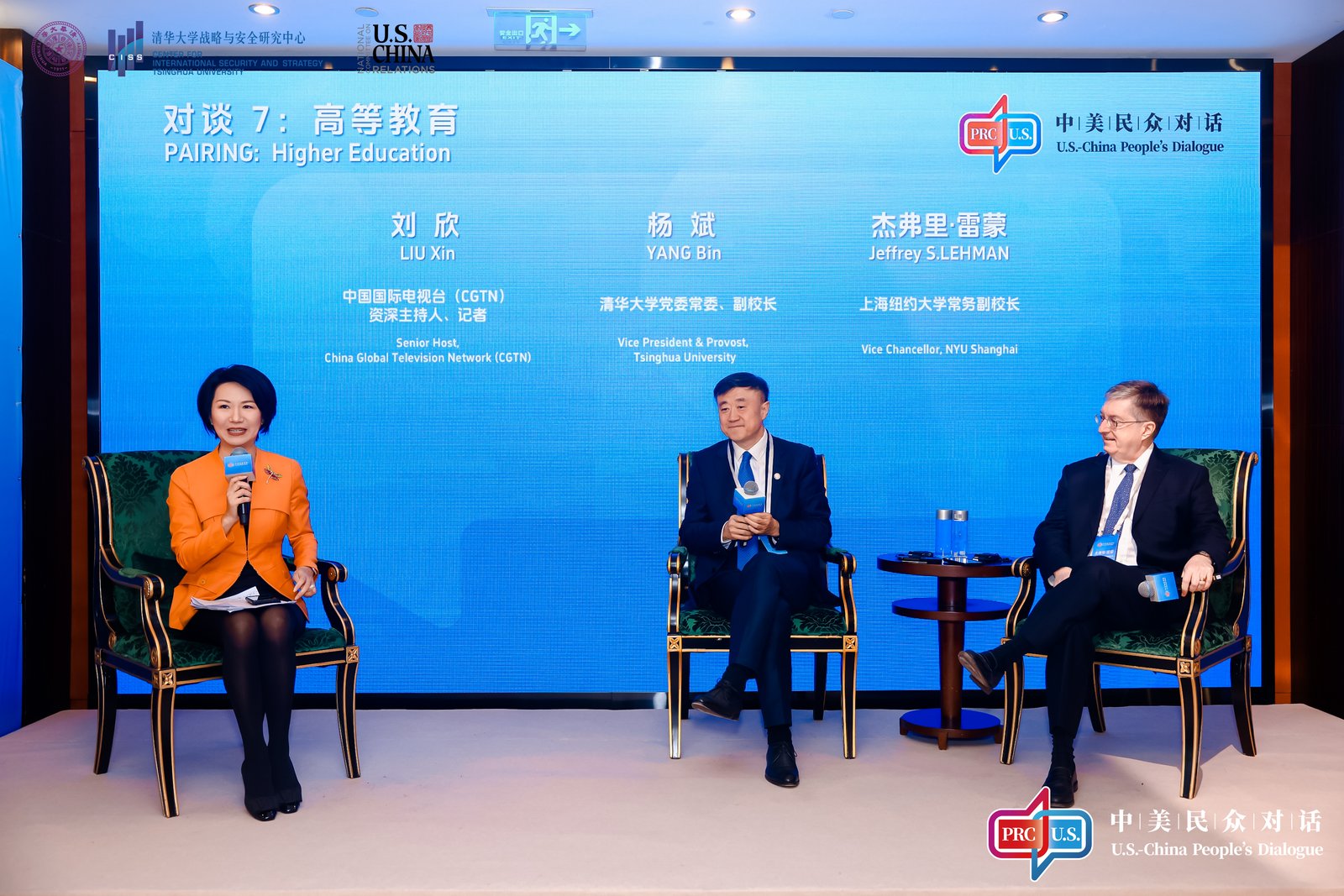
The eighth pairing focused on the significance and value of U.S.-China artistic and cultural exchanges and was moderated by Nancy Yao. Liu Tianchi, Associate Professor of the Department of Acting at the Central Academy of Drama, and Alison Friedman, Executive and Artistic Director of the Carolina Performing Arts, University of North Carolina, discussed the ways and diplomatic implications of U.S.-China artistic cooperation. Based on her teaching experiences, Liu said that art makes the world interesting and that Chinese and American artists can collaborate to create stories through filmmaking and other means, thus enhancing U.S.-China exchanges through cultural sharing. Friedman believes that art, as a social necessity, is a universal language that can promote mutual understanding between China and the U.S. through the formation of shared emotional experiences. She also mentioned that Ping Pong Productions she had founded aims to utilize the performing arts to connect the two countries.
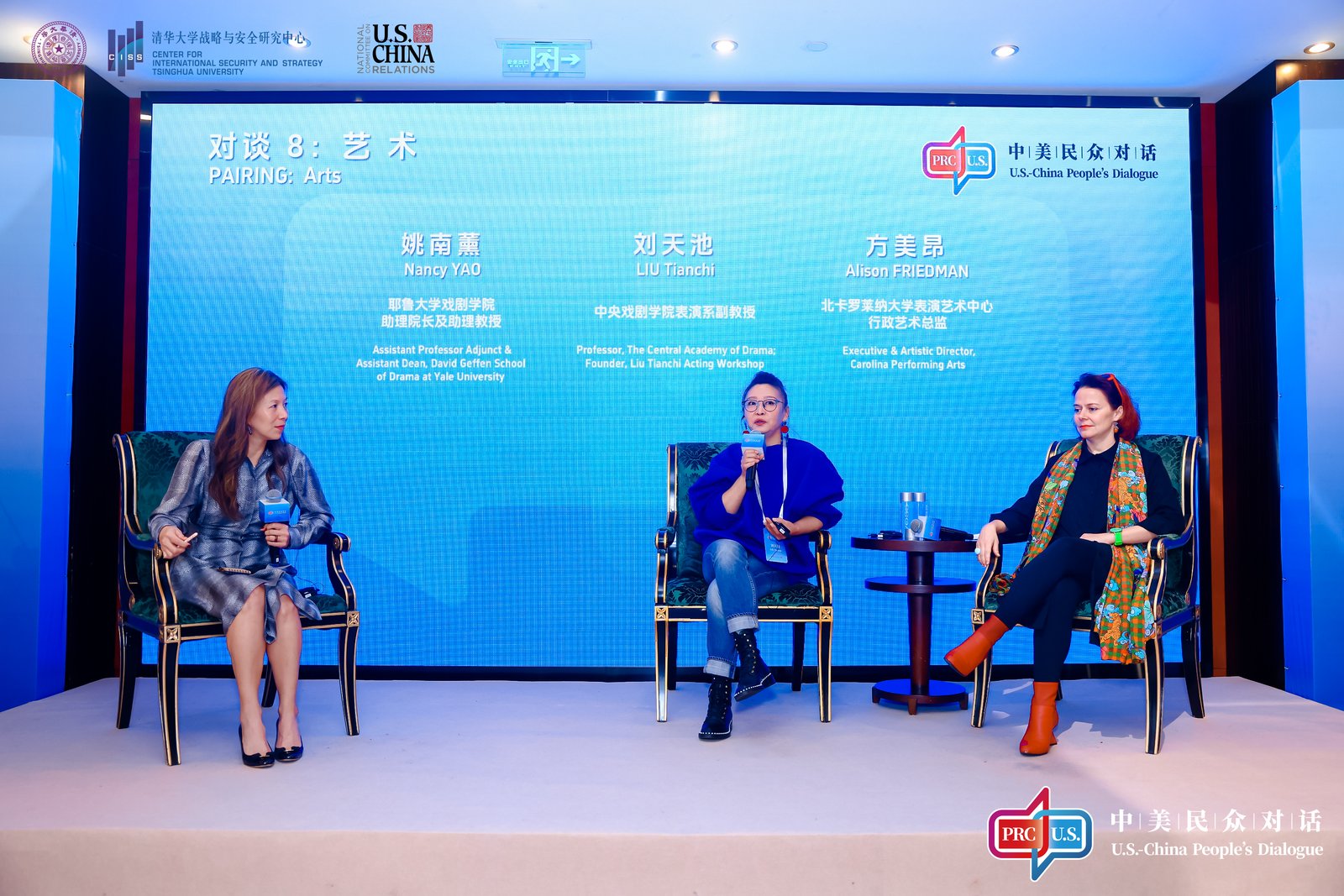
The ninth pairing focused on relationship management and cognitive harmonization in transnational marriages between China and the U.S. and was moderated by Nancy Yao. John Osburg, Associate Professor and Chair of the Department of Anthropology at the University of Rochester; Cameron Johnson, Senior Partner at Tidalwave Solutions, a consultancy based in Shanghai, and Vice Chair of the American Chamber of Commerce in Shanghai; and Caroline Li, Managing Director and Deputy Head of China Research at UBS, shared views in the context of their own family lives. According to Osburg, couples in transnational marriages continue to change each other’s limited views of foreigners and act as cultural ambassadors in each other’s social networks. Johnson saw similarities between dealing with marital relationships and dealing with U.S.-China relations, which will be deepened when Chinese and Americans no longer see each other as outsiders. Li emphasized that, similar to the need for a husband and wife to be equal, independent, and supportive of each other, the U.S. and China in the same world need to work more closely to address global challenges.
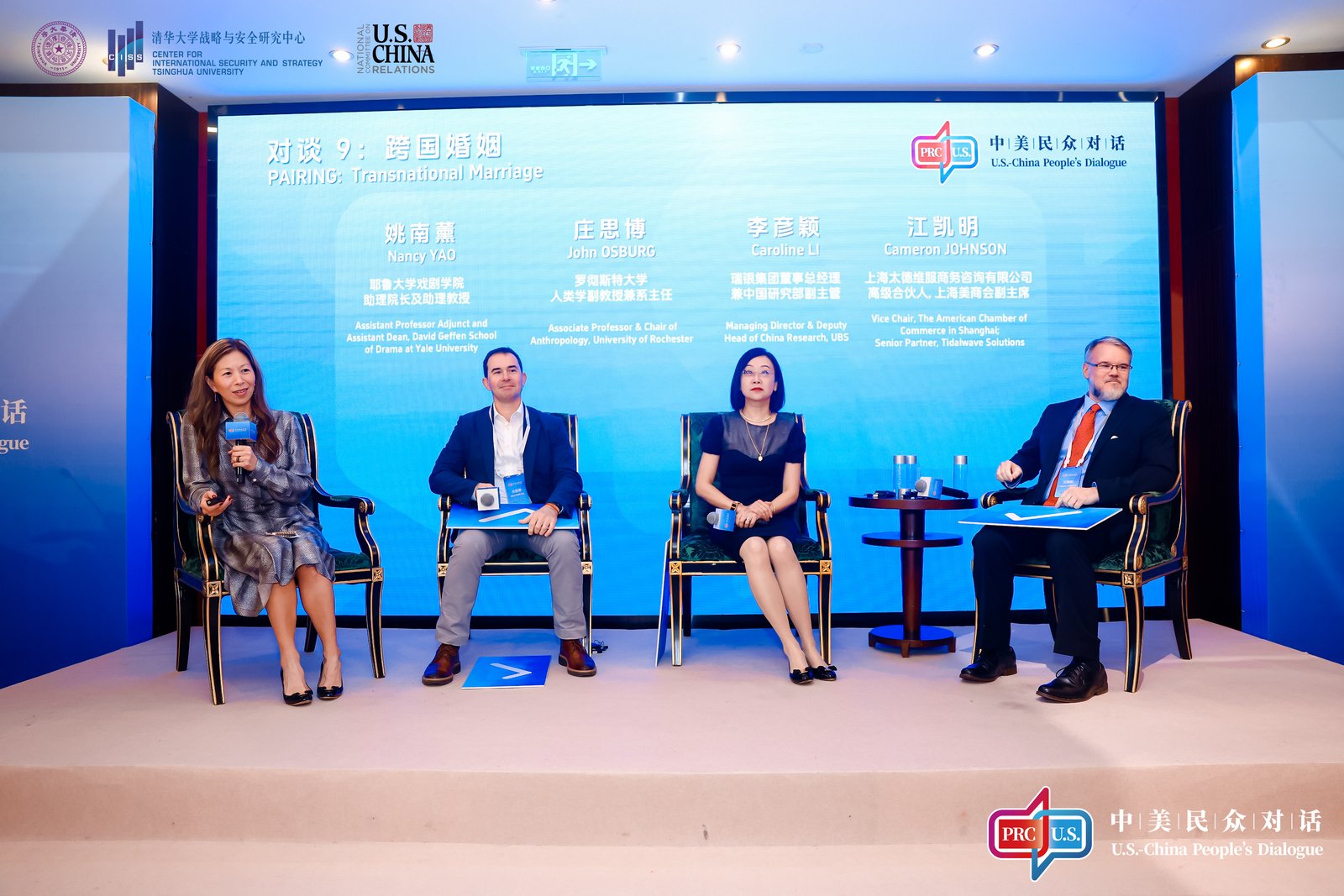
The tenth pairing, moderated by Yang Rui, focused on the current situation and challenges of building Chinese and American enterprises abroad. Wu Tao, Chairman and Chief Scientist of DART Imaging, and Roberta Lipson, Founder of United Family Healthcare, discussed the U.S.-China business environment for foreign companies in-depth in the context of their experiences in starting companies. According to Lipson, business relationships are the bridge that opens the door to U.S.-China cooperation. Collaborations at the enterprise level in the healthcare sector have undertaken and continue to undertake the important mission of promoting U.S.-China cooperation, and helping each other in the life-saving process can enhance mutual trust between the two peoples. Wu said that medical technology transfer between China and the U.S. is challenged by communication, environment, and policies and that enterprises are taking the initiative to bridge the gap between governmental cooperation and contribute to promoting U.S.-China exchanges.
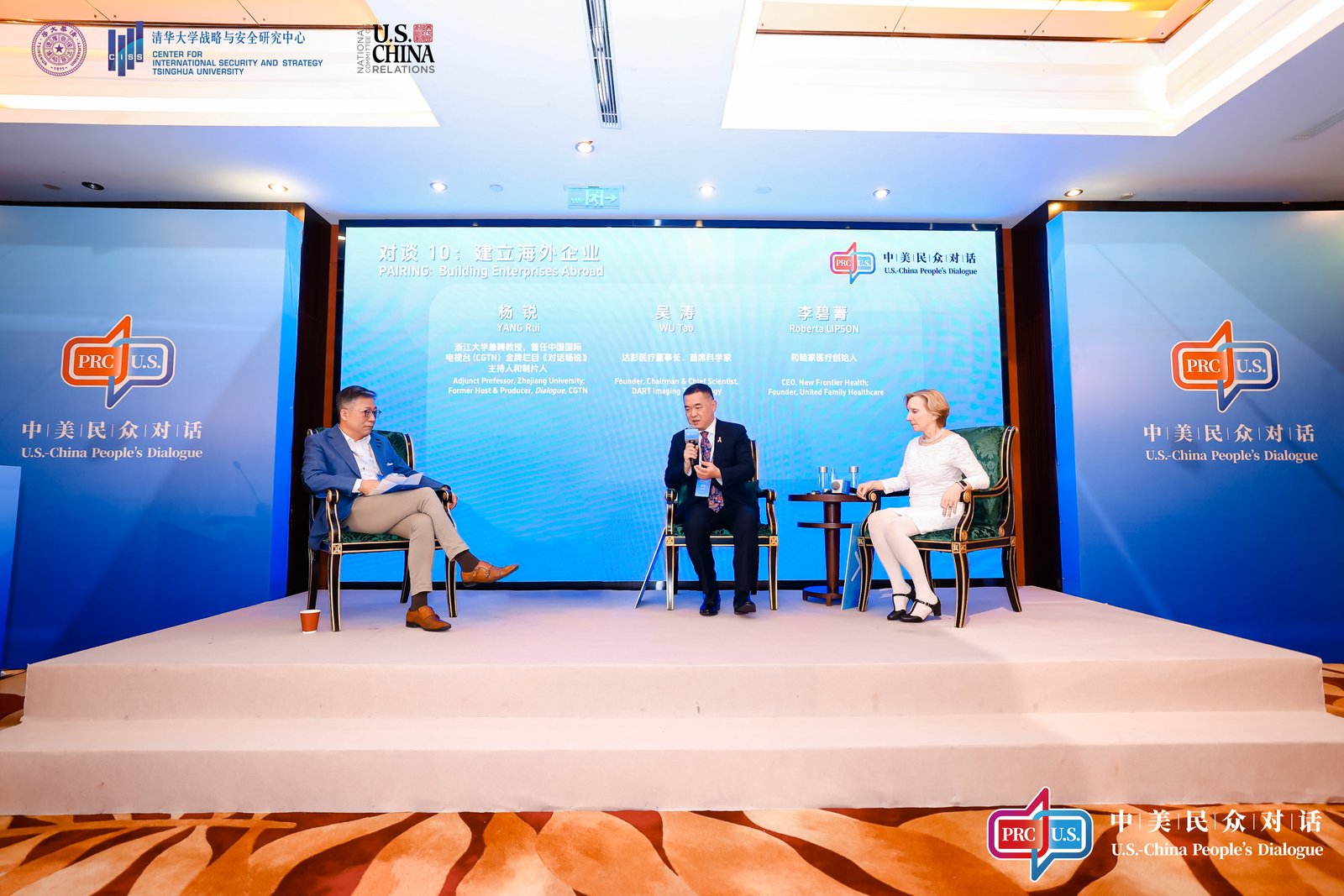
At noon on November 22, the Dialogue focused on early childhood development, and an event was held to introduce the “A Bright Start for Every Child” program of the China Development Research Foundation (CDRF). Fang Jin, Vice Chairman and Secretary General of CDRF, introduced the results of CDRF’s “China Rural Education and Child Health” (China REACH) program over the past nine years and showcased the newly launched “A Bright Start for Every Child” program, dedicated to improving the parenting environment and early education level of 100,000 children in rural villages. He emphasized that the gap in education resources between urban and rural areas is still obvious and called on all sectors of society to support the early education program in rural areas. He also introduced how generous donations from enterprises and individuals have continued to boost the program. Wang Xinrui, a 5-year-old child from Bijie, Guizhou, shared her story of growing up. Two Tibetan home visitors shared their touching stories of helping children with special needs out of difficult situations during program implementation. At the end of the event, Lu Mai, former Vice Chairman of CDRF and Initiator of the “A Bright Start for Every Child” program, reviewed China’s exploration of fairness and development and said that the program will promote the improvement of public policies through larger-scale social experiments and is expected to provide a stronger institutional guarantee for early childhood development.
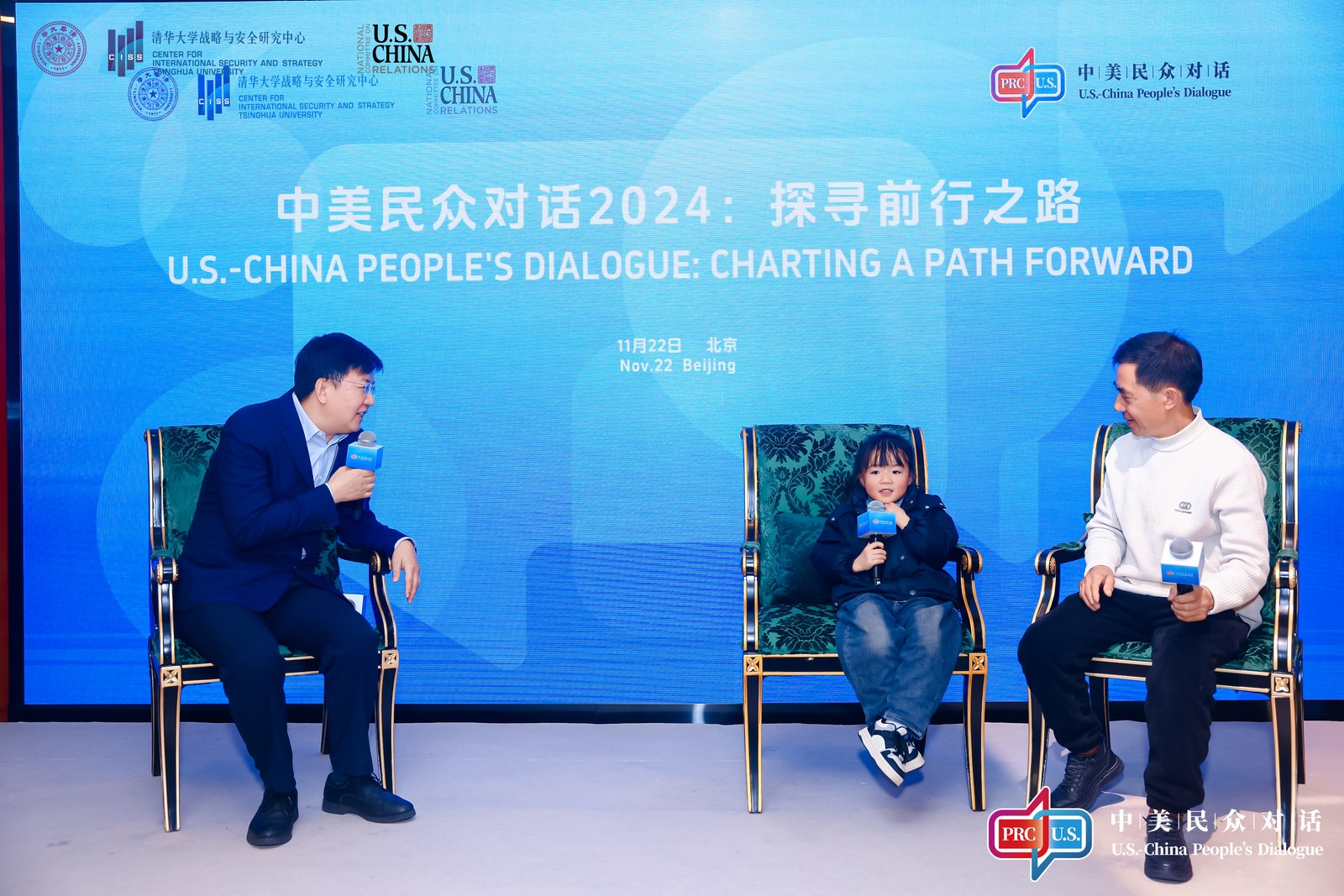
The 11th pairing, themed “Thought Leaders in U.S.-China Relations,” was moderated by John Holden, former President of NCUSCR and Managing Director of McLarty Associates. Amy Celico, a Partner at Albright Stonebridge Group, and Li Cheng, Professor of the Department of Politics and Public Administration and Director of the Centre on Contemporary China and the World at The University of Hong Kong, discussed the changes in the U.S.-China relations and the critical role of thought leaders in improving bilateral relations. Celico reviewed her work related to U.S.-China relations during her tenure in the U.S. government, noting that thought leaders lay the foundation for bilateral cooperation by providing policymakers with in-depth analyses and long-term perspectives. She suggested strengthening communication and understanding between the two countries through mechanisms such as the Track II Dialogue and called on businesses and academia to work together to promote cross-cultural cooperation. Li shared the representative contributions of Chinese and American thought leaders in international affairs and emphasized the importance of civil exchanges. He pointed out that despite the complexity and even challenges of the current U.S.-China relations, the open-mindedness and potential influence of the younger generation of Chinese and U.S. citizens may become a key driver for future improvements in the relations. In the discussion session, both sides had an in-depth discussion on the topics of misunderstanding and security in U.S.-China relations and the future of civil exchanges. They agreed that education and open dialogue are effective ways to break down prejudices and enhance understanding.
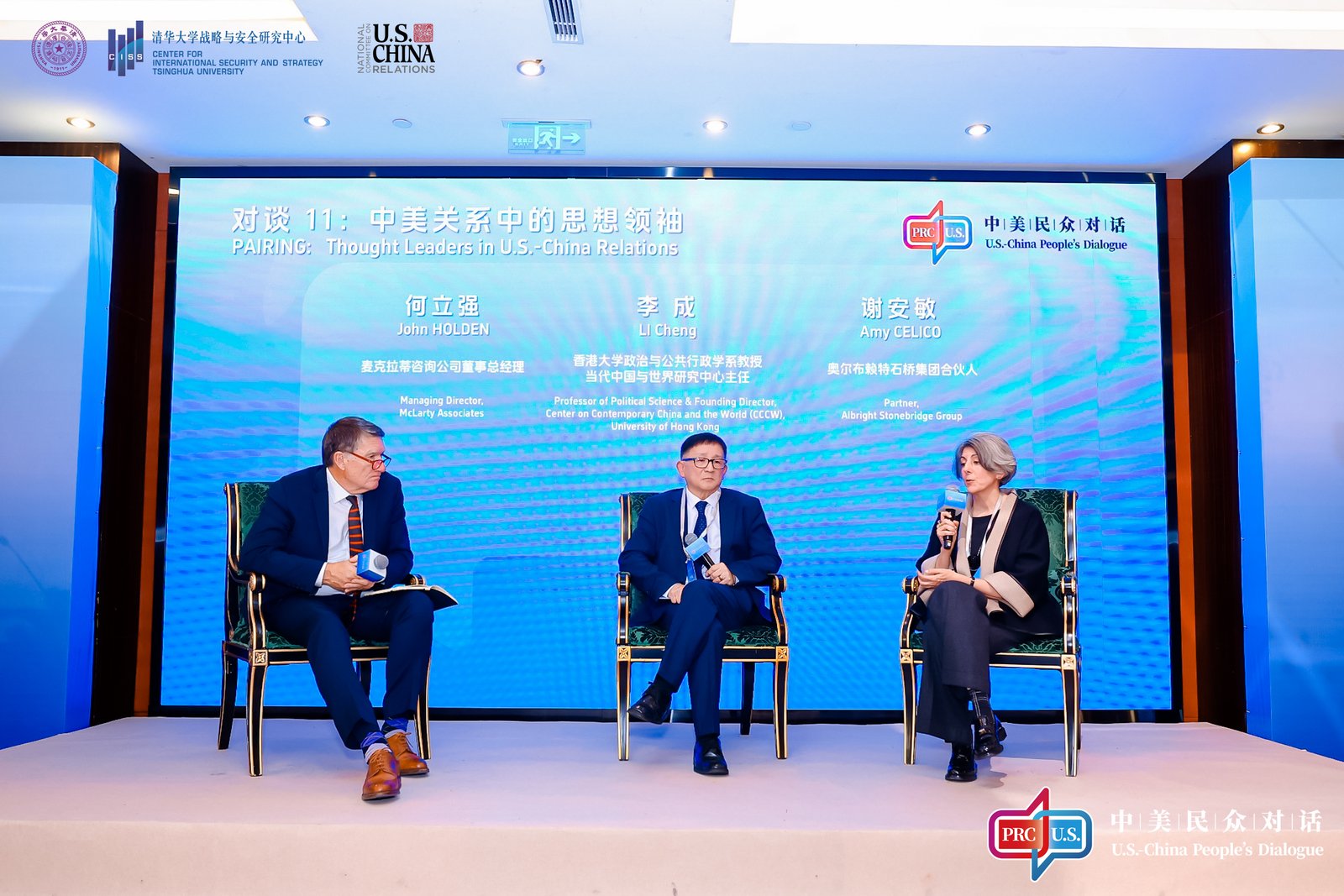
The 12th pairing, themed “Cultural Exchange and Civil Connection,” focused on the concrete practice of deepening understanding between the U.S. and China through cultural inheritance and interaction, and was moderated by John Holden. Yuan Ming, Honorary Dean of Yenching Academy at Peking University, and Pamela Leonard, Founder of the China Folk House project, discussed the role of cultural exchanges in promoting friendly relations between Chinese and American peoples. Yuan reviewed China’s historical practices in cultural heritage and international cooperation. She pointed out that civil cultural exchanges are not only the cornerstone of the relations between the two countries but also an essential way to address global challenges. Leonard shared the concept and practical experience of the China Folk House project. During the discussion, both guests agreed that in the current challenging context of U.S.-China relations, it is crucial to steadily promote and innovate cultural exchanges. The practice of education, cultural preservation, and art programs can inject more understanding and trust into bilateral relations and provide ideas for exploring new cooperation models.
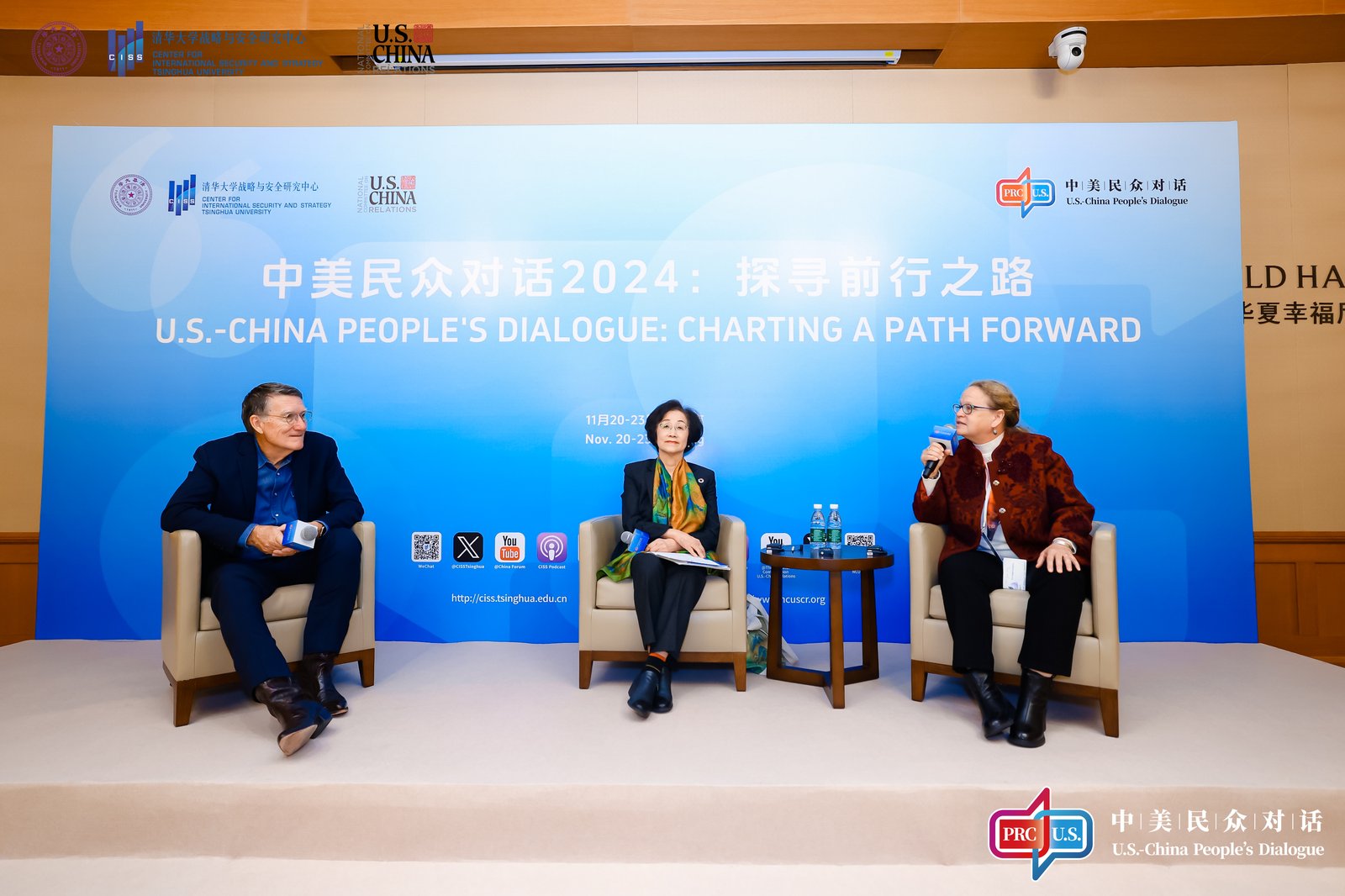
The 13th pairing centered on “Social Media and Information Dissemination” and was moderated by Yang Rui. Xu Tao, Founder and Chief Planner of ShengFM, and Paul Ashton, Founder and Content Creator of Qamp Consulting, discussed the role and challenges of social media in fostering communication between Chinese and Americans based on their personal experiences. Xu shared her observations from producing Chinese and English podcasts. She pointed out that social media platforms have broken down the barriers of traditional communication, allowing people from different cultural backgrounds to have a dialog in a more equal way. Ashton talked about his experience of social media in terms of its entertainment and educational functions. He gave examples of how humor and authentic personal stories can cross language and cultural barriers and create a relaxed atmosphere for interactions between Chinese and American youths. He also emphasized the need for content creators to focus on information authenticity and content responsibility while pursuing traffic. The pairing demonstrated the potential of social media in promoting civil diplomacy and cultural communication and revealed prejudices and misunderstandings in information dissemination.
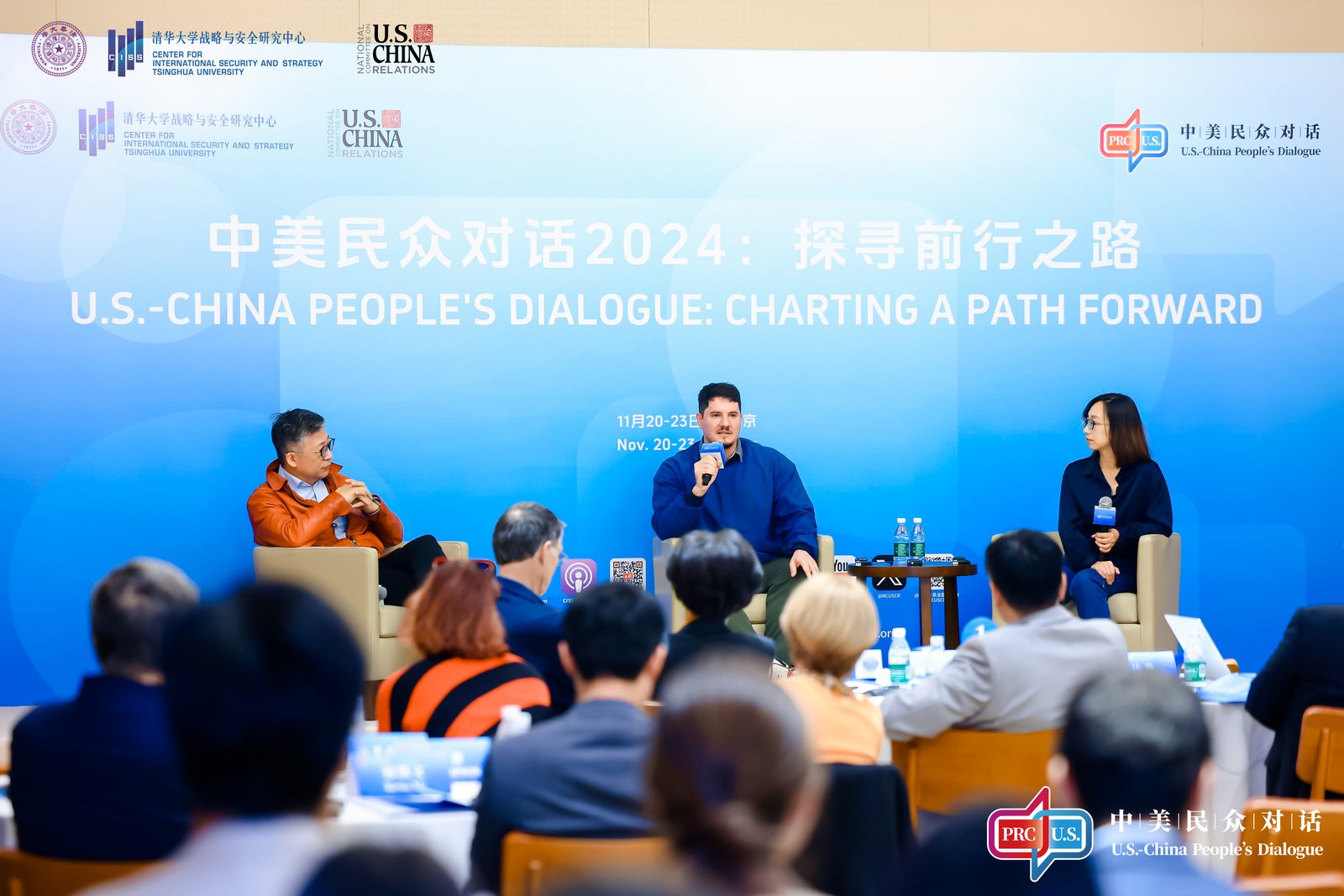
Youths are the main force and future of U.S.-China people-to-people exchanges. For this reason, the 12th and 13th pairings were held at Schwarzman College of Tsinghua University. More than 70 young students from Tsinghua University, Peking University, University of International Relations, China Foreign Affairs University, and other universities came to the venue. After the pairings, the guests and students were divided into four groups to have an in-depth exchange on the current situation and challenges of U.S.-China educational exchanges and the impact of educational exchanges on the young generation. Each group made a report to the plenary session at the end of the discussion, presenting their views and opinions on the promotion of U.S.-China people-to-people exchanges.
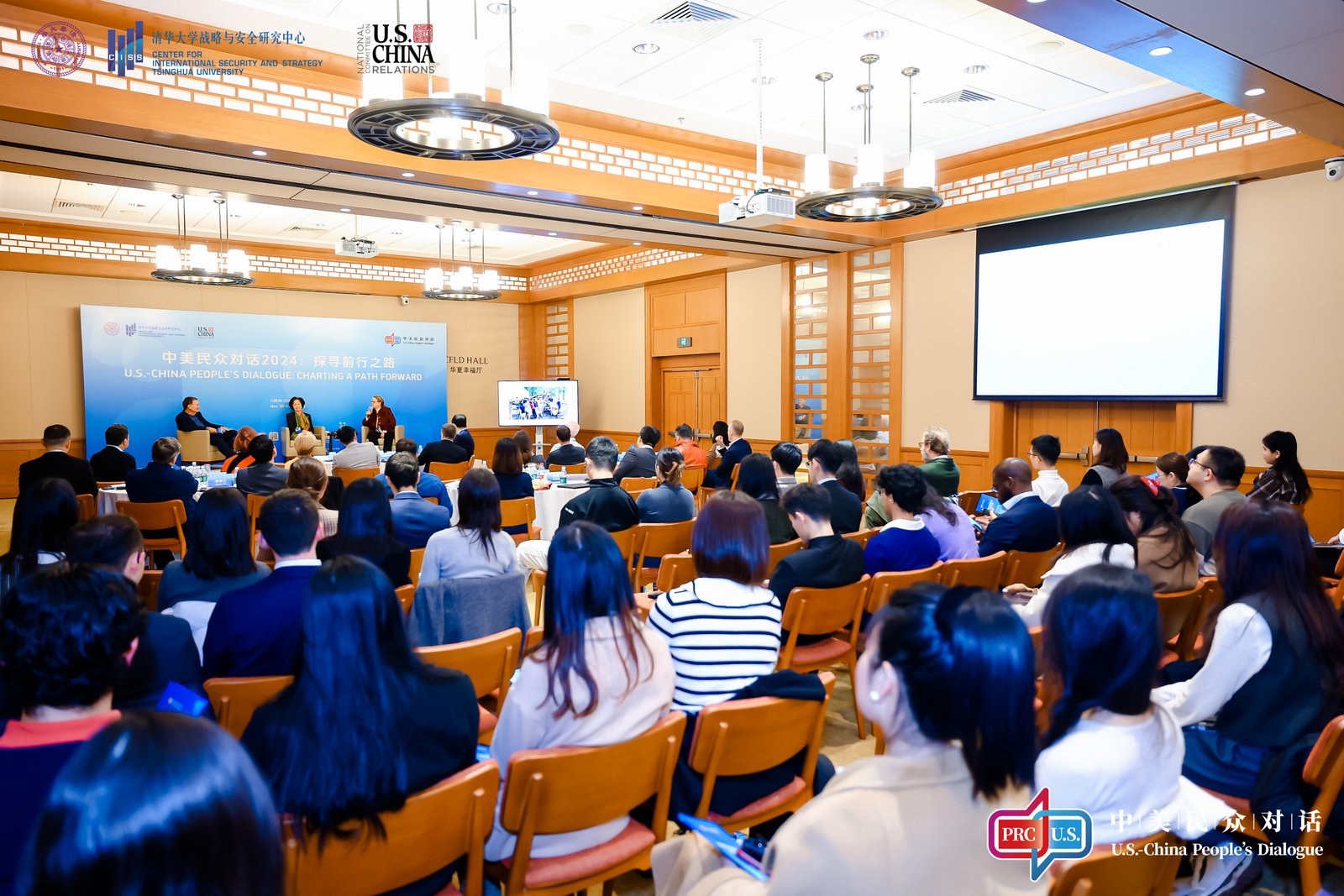
General Secretary Xi Jinping pointed out that “The hope of the China-U.S. relationship lies in the people, its foundation is in our societies, its future depends on the youth, and its vitality comes from exchanges at subnational levels.” The 2024 U.S.-China People’s Dialogue provided a platform for friendly and frank exchanges between Chinese and American professionals in various fields and gathered positive energy for U.S.-China relations. Participants collectively urged that despite the differences between the two countries and the large uncertainties in future relations, the two sides should continue to work on finding common ground and strengthening cooperation to realize the common prosperity of the two countries and the world.
The Dialogue was strongly supported and facilitated by the Academy of Contemporary China and World Studies.
